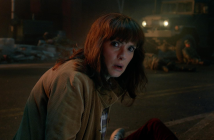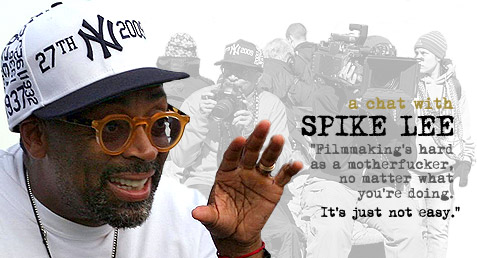
Spike Lee is a filmmaker with a formidable resume: “Do the Right Thing,” “She’s Gotta Have It,” “Malcolm X,” “Inside Man,” “The 25th Hour,” and the list goes on. When Bullz-Eye had the opportunity to sit down with Lee, however, the topic was a very specific one: his latest documentary, “If God Is Willing and Da Creek Don’t Rise,” the first part of which premieres on HBO on August 23nd. (Part 2 airs the following evening.)
Lee first took us on a cinematic trip to New Orleans with “When the Levees Broke,” which detailed the ravages of Hurricane Katrina on the area. Although his original plan was simply to do a follow-up, the project expanded…unfortunately for New Orleans…when the BP oil leak occurred. As a result, Lee, who had wrapped the documentary at the Super Bowl, went back to work and added an additional hour’s worth of material, along with an entirely new ending, one which he finished remarkably close to the film’s premiere. Talk about trying to get things as up to date as possible…
Spike Lee: Hey, what’s up, Will?
Bullz-Eye: Nothing much, Spike. Good to meet you. So I watched Parts One and Four of the documentary last night during HBO’s screening.
SL: Yeah?
BE: It was enthralling, man.
SL: Thank you.
BE: So when you completed “When the Levees Broke,” did you know at the time that you’d be going back?
SL: Oh, yeah. Yeah, I’d discussed with Sheila Meadows – she runs the documentary part of HBO – so we knew we’d be returning. It was just a matter of when. But, yeah, we knew it at the time.
BE: So you wrapped this film…
SL: Two weeks ago. (Laughs)
BE: Again. (Laughs)
SL: Yeah. We finished shooting two weeks ago, and we just finished mixing it yesterday.
BE: So what was the original ending of the film before the BP situation went down?
SL: (Long pause) I forgot. (Laughs) Because it was April 20th. We had to rethink and rework and reconfigure the whole movie, the whole documentary. The final part, the last hour, is now all BP.
BE: And you’re now officially wrapped, yeah?
SL: Oh, we’re done.
BE: Because you were cutting it so close to the premiere date that I didn’t know if you were literally planning to wait ‘til the last possible second to add a shot.
SL: (Laughs) Nah. I was telling them, “This is it. We’re done. If something happens, nothing we can do about it.”
BE: A third documentary.
SL: We’ll see.
BE: Hopefully not, for New Orleans’ sake.
SL: Yeah, hopefully it’s not going to be based upon another thing. They can’t take that much more.
BE: I’ll keep my fingers crossed for no giant meteors or anything.
SL: (Laughs) No earthquakes. No tidal waves. None of that.
BE: I really appreciated the way that you offered so many different viewpoints throughout the film, people you might love or hate, respect or revile. There are a lot of sides provided.
SL: Thank you.
BE: Was there anyone whose interview particularly changed your perception of the situation down there?
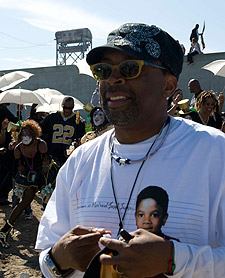 SL: I’m glad we got to speak to the fishermen, ‘cause those guys…they were affected the most by it, and these guys, all they know how to do is fish. That’s all their fathers knew how to do. That’s all their grandfathers knew how to do. All they do is fish. And to speak to these guys and to hear them talk about it, it makes everything legitimate. It’s, like, these are the people. It’s not somebody who doesn’t know what the fuck they’re talking about. It’s somebody there whose life depends on fishing, their life depends on the Gulf of Mexico. It’s the real thing. It happened where they’re from.
SL: I’m glad we got to speak to the fishermen, ‘cause those guys…they were affected the most by it, and these guys, all they know how to do is fish. That’s all their fathers knew how to do. That’s all their grandfathers knew how to do. All they do is fish. And to speak to these guys and to hear them talk about it, it makes everything legitimate. It’s, like, these are the people. It’s not somebody who doesn’t know what the fuck they’re talking about. It’s somebody there whose life depends on fishing, their life depends on the Gulf of Mexico. It’s the real thing. It happened where they’re from.
BE: Some of those guys said some things that were funny, but in a really dark way. Like, they had to be funny because they had no choice but to laugh it off.
SL: Well, I think that’s something that was a characteristic of “When the Levees Broke,” too, where they have to keep laughing to stop from crying. They do find humor in a lot of… (Hesitates) Gallows humor. That’s what it is.
BE: The one moment that wasn’t gallows humor, though, was when you were talking to the guy who was a foot fetishist.
SL: Oh, yeah. I said, “Well, what would’ve happened if her feet would’ve been jacked up?” He said, “I wouldn’t have married her, then?” (Laughs)
BE: I’m sure you enjoy it when moments like that come out of nowhere.
SL: Oh, yeah, I mean, I do all the interviews, and somehow people feel comfortable with me because they’ve seen my films, so they feel they can open up and be honest. Because a lot of times…I don’t know these people. Most of the time. I met ‘em for the first time ten minutes before the camera rolls. And the success of the film depends on people being open and sharing what they know. If they shut down and don’t talk and don’t share, then I don’t have a good interview, then that’s not going to make the film, and it’s gonna hurt the project in general.
BE: Is there anybody you tried to get an interview with that declined?
SL: Obama.
BE: I wondered about that.
SL: Yeah. Louisiana Governor Bobby Jindal. George Bush. (Michael) Chertoff. Ken Salazar.
BE: Did they give legitimate reasons, or did they just pass?
SL: Couldn’t fit into their schedule.
BE: Terrible. People are so busy these days.
(At this, Spike looked over the top of his glasses and made a scoffing sound.)
BE: (Laughs) In some films, the heroes and villains aren’t necessarily clear-cut. In this case…
SL: This one’s clear-cut: BP. Butt plugs. (Laughs)
BE: (Laughs) I was actually going to mention how funny that sequence was, where the guy’s reeling off the possible things that BP could stand for. Was that something you found online, or…
SL: Nah. I just kept seeing these ads for British Petroleum. Then they went to “Beyond Petroleum.” I said, “Wait a minute.” So we all sat around one day and said, “Let’s try to up with as many things as we can that BP stands for,” and we gave it to this guy, who actually is a P.A. We were in the French Quarter, and we said, “Let’s shoot this!”
BE: So what are your personal feelings on Ray Nagin?
SL: Nagin? I think he stayed one term too long. And as you saw in the film, a lot of people think he’s one of the worst mayors ever, so…
BE: Do you think his actions were well-intentioned, at least, or was it just political maneuvering?
SL: Well, here’s the thing: he’d never been in political office before. Same way with Chertoff. Now, I’ve done this, too. As a filmmaker earlier in my career, where I’ve put people in position and let them do work, have roles, do jobs that they’re not qualified for. And it doesn’t work. Ray Nagin had never been a politician before. Chertoff was a trial lawyer before he got to be the head of FEMA. That stuff comes back to haunt you.
BE: So I’ve seen Hours One and Four. What do Two and Three contain?
SL: Oh, all the stuff that’s happened in the last five years. The knocking down of the projects, the New Orleans police department. Education. Housing. Jobs. We visit a lot of people that we met in “Levees.”
BE: Was there a trip to Haiti at some point?
SL: A trip to…Haiti. Yeah. That’s right. (Gives a funny look, possibly because it must’ve seemed like the luckiest guess in the world)
BE: Well, I only wondered about that because you get a shot of the Haitian official that you spoke with during the closing credits.
SL: Oh, yeah, yeah. We took a trip to Haiti with Sean Penn. He was in “Levees,” too. Brad Pitt’s doing work in the lower 9th ward with his organization, the Make It Right Foundation. He’s built 50 homes already. Green homes.
BE: I liked his description of himself in the closing credits: “Self-employed.”
SL: (Laughs) Yeah.
BE: Speaking of Sean, I’ve got to ask you what you think about his comments toward Wyclef Jean running for president of Haiti. (Writer’s note: the story had literally broken only an hour or two before our interview took place.)
SL: I just saw a headline, so I don’t…I’ll have to read about more about it.
BE: I didn’t see much more than that myself, but it was one of the top stories on IMDb’s homepage. I guess Sean said that he questioned Wyclef’s motives.
SL: Sean Penn said that? I gotta go online. (Pauses) That was on the homepage of IMDb…?
BE: Yep. Right under the story about Will Arnett and Amy Poehler’s baby being born. So you know it’s big news.
SL: Who?
BE: Will Arnett and Amy Poehler. (Laughs) See, I told you it was big news.
SL: Uh-huh.
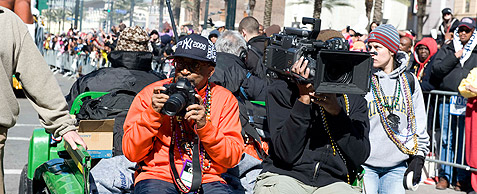
BE: To jump way back for a moment, what brought you into the world of documentaries in the first place? I mean, I know “Four Little Girls” was your first, but what inspired you to take a shot at one?
SL: I’ve always liked documentaries, and for me, they’re still filmmaking. I don’t know how other people work, but for me, I don’t make a strict delineation between narrative, documentaries, short films, videos, commercials. It’s all storytelling.
BE: Did you find it more challenging?
SL: Yeah! Filmmaking’s hard as a motherfucker, no matter what you’re doing. (Laughs) It’s just not easy. It’s not easy at all. Not easy.
BE: Is the editing process more difficult, trying to find all the right clips you need to tell the story appropriately?
SL: Well, you’ve got to have great researchers, too. That’s always a help. But, shit, you’ve got all this film, and you’ve got to shape and mold and caress it and massage it to get it right. And that’s the same thing you do in narratives.
BE: To move back to present day, did you even try to get Tony Hayward?
SL: (Shakes head) Nobody from BP would speak to us. But, c’mon, we didn’t need ‘em. Anything they said was gonna be a lie, anyway, so… (Trails off)
BE: I’ll tell you, those time-lapse shots at the end of the film where you show a shot for each day of the spill…? That’s powerful stuff.
SL: Thank you. Yeah, people liked that. That’s a Bruce Hornsby piece of music over that, too. It’s called “We’re Doing Work.”
BE: Oh, yeah? I’m from Chesapeake, VA, right around the corner from where he’s from.
SL: Yeah? That’s my man!
BE: How’d you and he first cross paths?
SL: Through Branford Marsalis.
BE: Which reminds me: I liked the variety of types of people that you mixed into the piece for interviews. Like, you put Dr. John in there. Of course, this is something that’s literally hitting home for him.
SL: Yeah. We wanted some known, some not. A cross-section of the great city of New Orleans and the state.
BE: Do you have favorite moments that really stand out for you?
SL: Phyllis Montana LeBlanc’s opening, the spoken word piece. I liked the whole Super Bowl thing. That was fun. That was great, being at that game and shooting that. I like that BP rant. And the thing you mentioned before, with the stop-motion footage. The homage honoring the dead people, the ones who died there, and the piece that closes it, the one by Shakespeare. (Writer’s note: to clarify, it’s a piece by a local spoken-word artist named Shelton “Shakespeare” Alexander.) And then the ending, where we’re out in front of the levee wall. “Who datsay gonnabeatdemSaints? Who dat? Who dat?” (Laughs)
BE: Was there anyone who hesitated at all when it came to offering up their information for the credits while holding a frame in front of their face?
SL: Nah. People loved that. We did that in “Levees,” too, though. Earlier today, this lady said, “Why do you those frames?” “Did you see ‘Levees’? It was in ‘Levees!’” “Oh.” (Laughs) What happened was, it seems bigger now because we ended with a lot more people than we did with “Levees.”
BE: Yeah, the guy sitting next to me said, “Geez, this has got to be 15 minutes all by itself!” And I’m, like, “Yeah, but it’s cool!”
SL: And I think it’s nice…for me, we think it’s a nice gesture. Nobody’s getting paid for this, so here’s your moment to shine. You introduce yourself, you tell everybody where you’re from, your occupation. Sometimes people say something else. You’re in the picture.
BE: I gotta tell ya, a couple of people got booed at the end.
SL: Oh, yeah? (Cackles) Who got booed? Mike Brown got it, I bet.
BE: Mike Brown, definitely. A couple of people spoke up about Ray Nagin, too.
SL: Nagin? (Laughs) He got it, too, huh?
BE: I heard someone hiss, “He ought to be ashamed of himself! Ashamed of himself!”
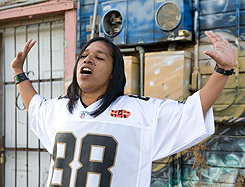 SL: (Laughs) Not specifically talking about Ray Nagin, but here’s the thing: these people have no shame. Tony Hayward has no shame. BP has no shame. They don’t care. As long as their pockets are filled with money, they don’t give a fuck. They don’t care who dies, who gets hurt. And it’s shameful. But they don’t care. As long as they get their money, that’s all that matters. That’s the bottom line.
SL: (Laughs) Not specifically talking about Ray Nagin, but here’s the thing: these people have no shame. Tony Hayward has no shame. BP has no shame. They don’t care. As long as their pockets are filled with money, they don’t give a fuck. They don’t care who dies, who gets hurt. And it’s shameful. But they don’t care. As long as they get their money, that’s all that matters. That’s the bottom line.
BE: It’s pretty clear that these films are affecting people. I mean, I’m in Virginia, I’ve got no direct connection to New Orleans, but it’s very easy to get emotionally caught up in the situation when you’re watching.
SL: Yeah, but I think our challenge is to try and make you understand that you do have a connection. 75% of the oil and gas comes from that area. 70% of the seafood comes from the region. So it affects you. People can’t just be, like, “Aw, that’s just them people down in New Orleans. We’re different.” It’s all tied together. They were trying to do some drilling in the Chesapeake Bay!
BE: Yes, they were.
SL: But that got squashed, didn’t it?
BE: It’s on hold, anyway. Hopefully for good.
SL: Yeah! That’s the thing. That’s why so many people refer to Alaska and that region as another world. They think, “They can do that there.” You can’t do that in California. You can’t do that in New York. Or Chesapeake! They’ll shut that right down. But Louisiana…? “Ah, they ain’t gonna care.” So a lot of stuff goes through there. It’s geopolitics. It’s where you are. But Louisiana…they ain’t got a lot of power.
BE: So what’s the tourist area of New Orleans like nowadays?
SL: You mean, like, the French Quarter?
BE: More or less, yeah. I mean, do they tend to act as if they’re an oasis, saying, “We’re okay here!”
SL: Nah. I mean, it’s all on top of each other, and they’re elevated higher than everybody else, but people are still worried everywhere down there. Especially now, ‘cause it’s hurricane season. And with BP…? All that oil and a hurricane, that’s not a good look. (Pauses) So what’s up with your boy Michael Vick? What’s going on with this?
BE: (Shakes head) Don’t get me started…
SL: You all from the same area, right?
BE: I never should’ve told you where I was from…
SL: (Cackles) I don’t think any teams will pick him up. He might have to go to China and play with (Stephen) Marbury! (Laughs)
BE: All right, I just got the “wrap it up” sign, but I wanted to ask you if you’ve got a favorite project you’ve worked on that didn’t get the love you thought it deserved?
SL: As far as critically? Or box office?
BE: Either, really.
SL: Well, I think that sometimes there are films you make that for whatever reason…I mean, everything is timing. “Raging Bull” is now considered one of the greatest films ever, but that didn’t make a dime when it came out. You know? So I think that “Miracle at St. Anna” is going to be discovered. It did not do well at all at the box office, and the reviews… (Trails off) But I think that’s one of my best films. So you just have to keep on keepin’ on, keep moving, and let those films keep adding to your body of work. You just keep going.
BE: Is there any film that didn’t work as well creatively as you’d hoped it would?
SL: All of ‘em. I mean, in all of ‘em, there’s stuff that you want to do. I don’t think I’ve ever made a film where I got everything I wanted in it. Maybe that’s something impossible to do. But I’ll tell you this, though: I know a lot of people get mad when I say this, but the truth is, of all the films I’ve done, the one I can’t watch is “She’s Gotta Have It.”
BE: Really?
SL: Can’t do it?
BE: Not even as a historical artifact?
SL: Nah. (Laughs) I don’t need that: I did the film. I was there!


